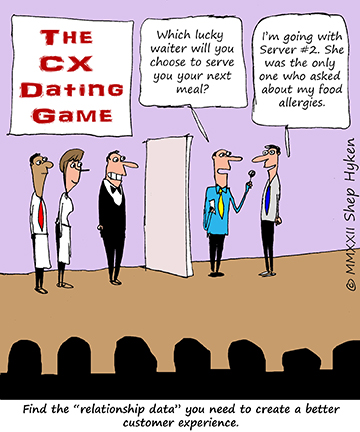Use Relationship Data to Build Stronger Connections
First, I hope the word "data" doesn't scare you off. We're not going to discuss the typical customer data that might bore most people, although I'll admit that I get excited and geek out about the data, stats, and facts that show trends in business. Today we're going to talk about relationship data.
First, understand that relationship data is information you have about a customer that you can't get by looking at a spreadsheet that includes information about all your customers. Even looking at buying patterns, how much an individual customer spends and other numbers related to business are more about revenue over relationships. What you're looking for from relationship data is the information you have about a customer that tells you what you need to know about them, and only them, compared to other customers. While some business numbers are important, there is more.
There are two kinds of relationship data. One is focused on business numbers, as just mentioned, and the other is personal information. Let's hit business first, mainly because this is what most people focus on anyway.
Relationship data, as it applies to business, can be seen in some of the spreadsheets you look at related to a customer. Digging a little deeper, it can show you what products the customer buys—and what they don't buy, which is actually more important than you think. So, if they aren't buying something they should be buying, then you should market and sell that to them. That's using the business relationship data to determine what you should be selling to your customers.

The Nike Membership program is a great example of relationship data for business. A customer may buy running shoes. As a result, Nike will send them information about running shoes, which could include interesting stories and new product announcements. What they won't do is promote other shoe categories. If a customer buys running shoes, why would they waste time with a basketball shoe promotion? The risk of spamming them with promotions that aren't appropriate could cause the customer to disconnect.
Then there is relationship data that is personal. This is what you know about the customer that you could only know if they shared information with you. Maybe it's as simple as knowing the customer's birthday. Or it could be something more personal, such as their children's names. Using this the right way can earn relationship points and help ward off competitors who don't have that personal relationship.
In a perfect world, you're able to take advantage of both personal and business relationship data. It's where customers don't see a business as just a vendor or a store. They feel connected—and maybe see it more as a friend and a partner. It all comes down to the relationship you have with your customer. The more you have, the greater potential to make that relationship stronger, bulletproofing you from your competition.
Shep Hyken is a customer service expert, keynote speaker, and New York Times, bestselling business author. For information on The Customer Focus™ customer service training programs, go to www.thecustomerfocus.com. Follow on Twitter: @Hyken
(Copyright © MMXXI, Shep Hyken)
This article was republished with permission and originally appeared at Shep Hyken.
Photo courtesy of Shep Hyken.



